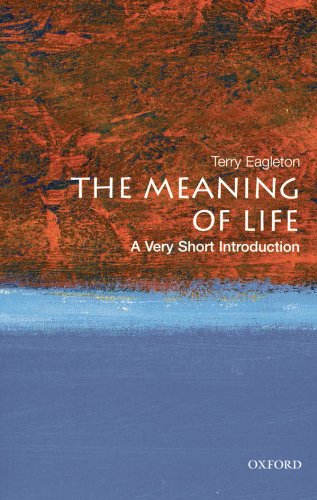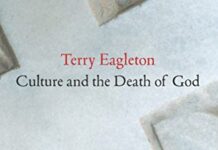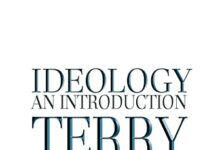
Ebook Info
- Published: 2008
- Number of pages: 126 pages
- Format: PDF
- File Size: 2.01 MB
- Authors: Terry Eagleton
Description
We have all wondered about the meaning of life. But is there an answer? And do we even really know what we’re asking? Terry Eagleton takes a stimulating and quirky look at this most compelling of questions: at the answers explored in philosophy and literature; at the crisis of meaning in modern times; and suggests his own solution to how we might rediscover meaning in our lives.
User’s Reviews
Reviews from Amazon users which were colected at the time this book was published on the website:
⭐Reading this book is like listening to a genius who produces a steady stream of insights (sometimes quite profound), but who’s unwilling or unable to organize them in a systematic way. This presents a challenge for the reader. In my case, after carefully reading the book (while highlighting), I went right back to the beginning and read it all over again (while taking notes), which is something I’ve never done before. After my second reading, and a lot of follow-up effort to organize my notes, I feel that I was able to get a handle on the book, and I’ll try to summarize my findings in this review.It seems to me that everything hinges on what we mean by “meaning.” Eagleton correctly describes how our unique language ability is what enables us to explore such an abstract question as the meaning of life in the first place, but we have to be careful that we’re not misusing language and thereby confusing ourselves. He describes how “meaning” may refer to intention, signifying, or intention to signify. These are useful distinctions, but I don’t think they quite hit the nail on the head. Rather, when we say that we want our lives to have meaning, I think that either (a) we want our lives, or elements of our lives, to have importance in an objective and ultimate sense (ie, THE meaning OF life), or (b) we want the personal experience which constitutes our lives, including the structure of that experience as it unfolds across time, to be subjectively satisfying, if not optimal (meaning IN life).These are two very different things. In the former, we’re looking for some sort of ultimate foundation that serves as a source of importance for what we do. Here are some of Eagleton’s insights which are relevant to this:- Maybe parts of lives have ultimate importance, but not our lives as a whole. Or, just the opposite, maybe no parts of our lives can have ultimate importance except in the context of our whole lives, or maybe even some larger context.- Our biological and sociocultural context may have something to do with what gives our lives ultimate importance.- Whatever gives our lives ultimate importance may require our active participation in order to be realized.- There may be something which gives our lives ultimate importance, but maybe few or no people have ever known what it is, or maybe no one will ever know. And maybe our not knowing is even necessary in some way.- We may already be living our lives in accordance with what gives them ultimate importance without even knowing it.- Our lives may simply have no ultimate importance. However, as long as we don’t know for sure, we can’t deny the possibility and there remains hope.The bottom line is that we don’t know what could give our lives ultimate importance, and we can’t even imagine anything that would do so, but we can’t rule out the possibility. The contemporary scientific picture offers nothing which would do that job, and of course some scientists claim that science actually argues against the possibility of our lives having ultimate importance. And if you survey the thought of the world’s religions and philosophies, both past and present, you’ll find that they offer a variety of metaphysical pictures and give direction on how to live for the sake of instrumental goals like connecting with God, receiving God’s help in this life, going to heaven (and avoiding hell), escaping from the cycle of reincarnation, avoiding suffering, etc., but none of these instrumental goals relates to anything which is ultimately and objectively important either.Rather, these instrumental goals relate to the second aspect of meaning I described above, which is to improve the subjective experience of our lives, either in this life, a future life (or lives), or both, so it’s hard to avoid the unpleasant conclusion that the motive is ultimately selfish. Eagleton offers many useful insights here as well:- In the pre-modern world, largely unquestioned social norms defined how life was to be lived. Deviance could lead to being ostracized, banished, or executed, so adherence to social norms improved one’s life experience, or at least avoided worsening it.- In the modern world, with the (sometimes disillusioning) breakdown of social norms and increase in relativism, many people have concluded that they are themselves responsible for choosing thoughts and actions which improve the quality of their life experience. The choices made can vary widely from one person to another, and can range from thinking small (postmodernism) to thinking big (ideologies and grand narratives). Some people will find the plurality of potential choices disorienting and undesirable, whereas others will relish such pluralism.- We often can’t predict the effect of our choices of thoughts and actions, so there can be unintended positive and negative effects of those choices with respect to our life experience.- Somewhat reflexively, the experience of reflecting on how to improve one’s life experience can itself be a positive life experience (this is related to the paradoxical idea that the meaning of life is to search for the meaning of life), but such reflection can also go too far and thus be counterproductive.- We can view our mortality as enhancing our life experience because it makes the time we have more precious, but we’re also justified in lamenting what our mortality takes away from us.- Happiness relates to the quality of our lives over an extended timeframe (possibly our entire lives), whereas pleasure relates to more fleeting moments of quality of life.- Since capital is only a means to an end, endless accumulation of capital isn’t a good formula to improve the quality of one’s life experience. At some point, enough is enough.- One formula to improve the quality of one’s life is to be virtuous and creatively realize one’s particular faculties in a social context. This gives love a central role.- The quality of our life experience may not satisfy us, even if we try our best to improve it. Circumstances and luck play a role here.Overall, I benefitted greatly from this book, but that’s partly because of the considerable effort I had to make to grapple with the book. So I can recommend this book, but be prepared to do some grappling yourself.
⭐I recall in one of the Star Trek films that Kirk and Bones were singing the song, `Row, Row, Row Your Boat.’ Spock was puzzled at the idea presented in the simple song. He concluded, quite logically, that the song was wrong – life is not a dream. But then, what is life? What is the meaning of life? Eagleton’s small text doesn’t purport to give a once-and-for-all definitive answer to this question (for the shortest answer to this, perhaps one must go to `The Hitchhiker’s Guide to the Universe’ or one-syllable meditative objects of some Eastern practices). This book is part of the Very Short Introduction series by Oxford University Press, but the copy of the book that I possess is actually under a different cover (the internal text is the same).Eagleton begins with a preface that starts, `Anyone rash enough to write a book with a title like this had better brace themselves for a postbag crammed with letters in erratic handwriting enclosing complex symbolic diagrams.’ One of the difficulties, of course, is that this is an area where philosophers and theologians overlap with every armchair (and pub stool) analyst. And there may be as much validity in the workings of the later as in the former. One of the advantages that the philosopher might have over the less academic is that the structure of the questions that follow from this are perhaps more apropos. The meaning of life proceeds quickly to the question of why there is anything at all, and this gets into the realm of understanding being vs. nothingness, but then it also gets into the linguistic areas that the twentieth century in particular is noted for – Wittgenstein, Nietzsche, Sartre, Freud, and others whose thinking has had profound effect on the twentieth century (even if they themselves were not twentieth century figures) are discussed. Eagleton freely allows that `philosophers seem to have been reduced to no more than white-coated technicians of language.’ Of course, language is how we make meaning and interpret meaning even a la many non-verbal communicative forms, but we then get into a chicken-and-egg dance about which comes first.Eagleton states that we often have recourse to the question of the meaning of life when things that we take for granted break down – it has been common through history that in times of crisis, religious sentiment and practice increases, as people look for something stable. And yet our very way of trying to make meaning in the modern to postmodern world is unstable. Looking at works like those of Samuel Beckett, Eagleton describes `the evaporation of stable meaning’, but then goes on to look at literature, art, music, and other aspects of culture as well as philosophy to try to construct something back into existence. Love and Happiness, in the end, are key components to Eagleton’s prescription for making an answer to the question of the meaning of life, and this is something that is done both individually and communally, in tension with each other.This book is a short one – the pages are small format (large index-card sized) and there are fewer than 200 pages at that, and thus the book could be read in one or two sittings quite easily. However, this is just to take in the text; for real analysis of the questions, one will want to ponder it for a longer time. Eagleton comments in a footnote that he saw a film entitled `The Meaning of Life’ (not the Monty Python one; however, he did see that one, too) at Salt Lake City, as a production by the Mormon Church, but noted that he only really remembered that the duration of the film was a mere four minutes long. In the world of philosophy texts, Eagleton’s brief text might be the literary equivalent of such a brief encounter with the question, and yet if one takes the time to ponder the question, one can realise that this is but one step along the way toward understanding life in the deepest way.This book will not have all the answers, but it can help one to formulate the questions.
⭐Very small print, 100 page summary of modern philosophy (with quick reference to Greeks for background). Throughly enjoyable, even humorous at times. Highly recommended as a Big Picture context for the question “The Meaning of Life: a very short introduction”. For example, his reference to Douglas Adams answer of “42”. You will not regret having this little book in your back pocket for easy reference. Why one star short? The first ten pages were maddening; I had to stop reading for a month or more. One of the quotes on page nine after his long elaboration that there probably is no meaning to life was on page 9, “It is even conceivable that not knowing the meaning of life is part of the meaning of life.” Now I laugh, because the rest of the 91 pages made up for all his equivocating!
⭐Readable, yet thought-provoking and, most importantly of all, erudite. Eagleton put into words my basic questions that I’ve had all my life, plus added nuance and depth to them. A must-read for those, like myself, want to understand these important questions in the context of daily life, but aren’t looking for self-help. Eagleton is a major thinker in literary theory, and so he is able to bring the depth and breadth of his understanding of philosophy, history, politics, etc. to bear on these important questions in a way that makes them accessible to the layperson. His book has enough intellectual rigor to do the topic justice and make sure you go away with a lot more understanding than when you started, without the byzantine references and conceptualizations meant for academics but are just mind-numbingly esoteric to the rest of us. I’m going to re-read it because I learned so much. And it’s readable enough for me to bring along while I’m doing my workout at the gym.
⭐As good a book as you’re likely to find on a subject that is inherently difficult to write about (or even to think about!). Eagleton does an admirable job here and I found myself highlighting sentences and paragraphs on almost every page. The Very Short Introductions series rarely disappoints.
⭐Philosophy is frustrating in that even straightforward questions are made questionable. Eagleton looks for the answer to this question of meaning by examining the meaning of the question. At the last he comes close to an answer but he might be trying to avoid one.
⭐This si a grata book
⭐There’s too much Theology here but Terry Eagleton is always worth reading.
⭐Loved it
Keywords
Free Download The Meaning of Life: A Very Short Introduction (Very Short Introductions) 1st Edition in PDF format
The Meaning of Life: A Very Short Introduction (Very Short Introductions) 1st Edition PDF Free Download
Download The Meaning of Life: A Very Short Introduction (Very Short Introductions) 1st Edition 2008 PDF Free
The Meaning of Life: A Very Short Introduction (Very Short Introductions) 1st Edition 2008 PDF Free Download
Download The Meaning of Life: A Very Short Introduction (Very Short Introductions) 1st Edition PDF
Free Download Ebook The Meaning of Life: A Very Short Introduction (Very Short Introductions) 1st Edition





